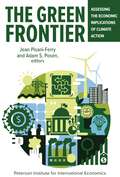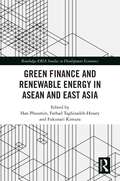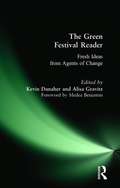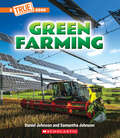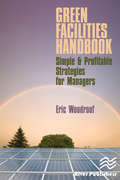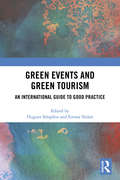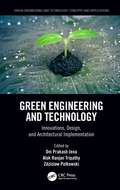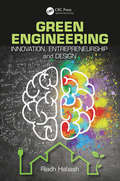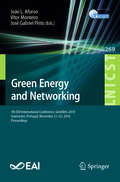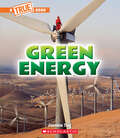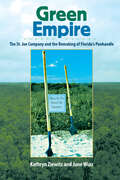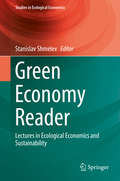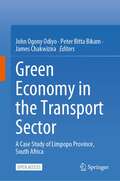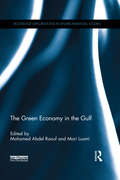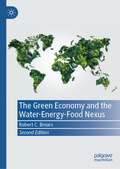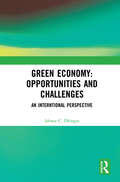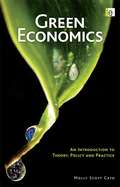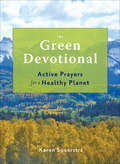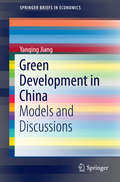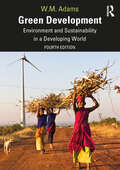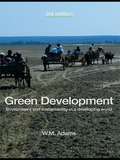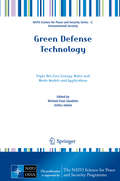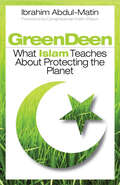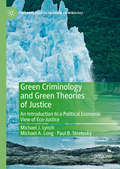- Table View
- List View
The Green Frontier: Assessing the Economic Implications of Climate Action
by Jean Pisani-Ferry and Adam S. PosenAddressing climate change will entail major challenges for economic growth, employment, inflation, and public finances. Mitigating the impact of global warming will yield benefits and costs that are yet to be quantified and defined for the global economy and for nations, workers, households, and companies. The Green Frontier: Assessing the Economic Implications of Climate Action offers research originally presented at a major conference at the Peterson Institute for International Economics in June 2023 in Washington, DC, organized to shed light on this still unexplored field of study and recommend policies for the future.
Green Finance and Renewable Energy in ASEAN and East Asia (Routledge-ERIA Studies in Development Economics)
by Han Phoumin Farhad Taghizadeh-Hesary Fukunari KimuraGreen Finance and Renewable Energy in ASEAN and East Asia edited by Phoumin, Taghizadeh-Hesary and Kimura provides several empirical policy-oriented studies with new data on ASEAN member states and East Asian economies that deal with innovative and market-based solutions for unlocking private investments in renewable energy projects. In the wake of COVID-19, the importance of innovative ways and policies for enhancing investments in renewable energy projects to achieve climate-related goals is highlighted. Chapters cover various aspects and means of green finance for renewable energy development, including identifying the financing barriers and solutions for mitigating them, cleantech finance and energy transition, green investment risks, green technology financing, market development, carbon taxation, green bonds, FinTech, and green digital finance. The book collectively provides policy recommendations for designing funding strategies for renewable energy development in ASEAN and East Asia. A valuable resource to end-users, policymakers, and market players in ASEAN, East Asia, and the rest of the world on access to finance for renewable energy development.
The Green Festival Reader: Fresh Ideas from Agents of Change
by Alisa Gravitz Kevin DanaherThe Green Festivals now draw over 100,000 visitors every year in four U.S. cities. This book collects the most memorable talks from all four festivals on the most urgent social issues of the day.
Green Farming (A True Book (Relaunch))
by Daniel Johnson Priyanka LamichhaneEnvision a brighter future with this STEM-based subset of True Books.Thanks to the development of agriculture, our Earth can feed the almost 8 billion people that call it home. But the challenge facing us today is how to make the practice of large-scale farming sustainable. We have learned how to use alternative energies = like solar and wind power = to run our farms. We have also learned how to use the land and the animals on it in a more environmentally friendly way. Green Farming will show you how.ABOUT THE SERIES:What would a green future look like? Will trains and airplanes be powered by the sun? Will we have homes that have zero impact on the environment? The most pressing challenge facing us today is how to ensure a healthy Earth for ourselves and future generations. This STEM-based set of A True Books introduces students to the engineering innovations that can help us reach those goals. Interesting information is presented in a fun, friendly way = and in the simplest terms possible = and will inspire kids to start envisioning and enacting a more sustainable future.
Green Facilities Handbook: Simple and Profitable Strategies for Managers
by Eric WoodroofMeeting a need in the marketplace for information on how to operate a sustainable facility and reduce carbon emissions, the Green Facilities Handbook clearly explains why green business is good business and delineates practical strategies to green your operations in energy and management. The book explores issues in the greening of a facility, including janitorial considerations, fuel choices for fleets, and recycling. Additional information is provided on carbon reduction terminology, monitoring and reporting, and carbon trading as well as offset strategies. Special bonus chapters include valuable information on financing and procedures for “green” marketing.
Green Events and Green Tourism: An International Guide to Good Practice
by Hugues Seraphin Emma NolanAs the appetite for leisure travel and events continues to grow at an exponential rate, the impact on the environment and local communities is becoming an increasing concern, not least by the users of the services. Green approaches to tourism and events are growing in popularity and present an opportunity to both identify solutions to significant environmental and societal problems and new approaches to business. <P><P>Green Events and Green Tourism looks at key frameworks, guidelines, principles and benchmarks that support the application of sustainability in practice. The five sections of the book cover themes of governance, accreditation, certification, innovation, priorities, trends, ambitions and consumer behaviour, and the chapters include examples of best practice in the organisation of music and arts festivals, special interest tourism, the green management of outdoor sites and the management of sports events. Readers will benefit from insightful case studies from around the globe.
Green Engineering and Technology: Innovations, Design, and Architectural Implementation (Green Engineering and Technology)
by Om Prakash Jena Alok Ranjan Tripathy Zdzislaw PolkowskiEscalating urbanization and energy consumption have increased the demand for green engineering solutions and intelligent systems to mitigate environmental hazards and offer a more sustainable future. Green engineering technologies help to create sustainable, eco-friendly designs and solutions with the aid of updated tools, methods, designs, and innovations. These technologies play a significant role in optimizing sustainability in various areas of energy, agriculture, waste management, and bioremediation and include green computing and artificial intelligence (AI) applications. Green Engineering and Technology: Innovations, Design, and Architectural Implementation examines the most recent advancements in green technology, across multiple industries, and outlines the opportunities of emerging and future innovations, as well as practical real-world implementation. Features: Provides different models capable of fulfilling the criteria of energy efficiency, health and safety, renewable resources, and more Examines recycling, waste management, and bioremediation techniques as well as waste-to-energy technologies Presents business cases for adopting green technologies including electronics, manufacturing, and infrastructure projects Reviews green technologies for applications such as energy production, building construction, transportation, and industrialization Green Engineering and Technology: Innovations, Design, and Architectural Implementation serves as a useful and practical guide for practicing engineers, researchers, and students alike.
Green Engineering: Innovation, Entrepreneurship and Design
by Riadh HabashThis is a primary text project that combines sustainability development with engineering entrepreneurship and design to present a transdisciplinary approach to modern engineering education. The book is distinguished by extensive descriptions of concepts in sustainability, its principles, and its relevance to environment, economy, and society. It can be read by all engineers regardless of their disciplines as well as by engineering students as they would be future designers of products and systems. This book presents a flexible organization of knowledge in various fields, which allows to be used as a text in a number of courses including for example, engineering entrepreneurship and design, engineering innovation and leadership, and sustainability in engineering design
Green Energy and Networking: 5th EAI International Conference, GreeNets 2018, Guimarães, Portugal, November 21–23, 2018, Proceedings (Lecture Notes of the Institute for Computer Sciences, Social Informatics and Telecommunications Engineering #269)
by José Gabriel Pinto Vítor Monteiro João L. AfonsoThis book constitutes the refereed post-conference proceedings of the 5th EAI International Conference on Green Energy and Networking, GreeNets 2018, held in Guimarães, Portugal, in November 2018. The 15 full papers were selected form 26 submissions and cover a wide spectrum of ideas to reduce the impact of the climate change, while maintaining social prosperity. In this context, growing global concern leads to the adoption of the new technological paradigms, especially for the operation of future smart cities.
Green Energy (A True Book (Relaunch))
by Jasmine TingEnvision a brighter future with this STEM-based subset of True Books.We use a lot of energy to power our lives = from our homes and cars to our tablets and handheld games. The challenge facing us today is finding sustainable energy methods that will ensure a green future. There are seven different types of green energy = and they are the only types that don't pollute our Earth. We have learned how to harness the power of the sun, wind, water, and Earth. And technological innovations have allowed us to put these alternative energies to work in our everyday lives. Green Energy will show you how.ABOUT THE SERIES:What would a green future look like? Will trains and airplanes be powered by the sun? Will we have homes that have zero impact on the environment? The most pressing challenge facing us today is how to ensure a healthy Earth for ourselves and future generations. This STEM-based set of A True Books introduces students to the engineering innovations that can help us reach those goals. Interesting information is presented in a fun, friendly way = and in the simplest terms possible = and will inspire kids to start envisioning and enacting a more sustainable future.
Green Empire: The St. Joe Company and the Remaking of Florida's Panhandle
by Kathryn Ziewitz June WiazSince the Great Depression, the St. Joe Company (formerly the St. Joe Paper Company) has been Florida's largest landowner, a forestry and transportation conglomerate whose influence has been commensurate with its holdings. The company owns nearly one million acres, mainly in northwestern Florida, where undeveloped coastal and riverside landscapes boast some of the state's most scenic and ecologically diverse areas. For 60 years, the company focused on growing trees, turning them into paper, and managing its ancillary businesses. In the late 1990s, the company shifted directions: it sold its paper mill, changed its name, and launched a concerted drive to turn its natural-resource assets into greater profits. Today the St. Joe Company is a critical and fiscally powerful force in the real-estate development of northwest Florida, with access to the most influential people in government. Based on hundreds of sources--including company executives, board members, and investors, as well as outside observers--this factual and balanced history describes the St. Joe Company from the days of its founders to the workings and dealings of its present-day heirs. For anyone concerned with land use and growth management, particularly those with an interest in Florida's fragile wildlife and natural resources, Green Empire will illuminate the issues surrounding the relationship between one of the most ambitious players in Florida's real-estate market and the state's last frontier.
The Green Edit: Easy tips for everyday sustainable living
by Kezia NeuschCreate a happy, beautiful and eco-friendly homeHaving a happy, healthy home is a key part of our wellbeing, but how do we ensure the pursuit of our perfect living space doesn't negatively impact on the environment?Blogger and low-waste expert Kezia Neusch provides simple swaps and genius hacks to help you reduce your household’s ecological footprint, covering everything from how to break up with your tumble dryer and why your mid-morning snack might be harming the planet.This book contains everything you need to know to create a sustainable home for you and your family.
Green Economy Reader
by Stanislav ShmelevState of the art in sustainability thinking, inspired by interdisciplinary ideas of ecological economics. This book is focusing on sustainability pathways, new economic theory, democracy and institutions, multidimensional assessment of sustainability, macroeconomic modelling and policies, climate change and renewable energy, resource flows and circular economy, regenerative cities, environmental conflicts and values. It will be helpful for MSc and PhD students in Economics, Management, Environmental Change, Ecological Economics, Development Economics, Sustainability and practitioners in business, international and nongovernmental organizations. Rich, diverse and thought provoking collection of top level contributions, it will help to facilitate the transition towards sustainability and educational reform. A fabulous composition of papers by the authors who really count! Ernst von Weizsäcker, The Club of Rome The authors present a refreshing perspective on the possibilities of human progress in harmony with nature, without the need for economic growth to secure long term human welfare and wise use of nature's services. Extremely relevant. Peter May, Past President, International Society for Ecological Economics and Professor, UFRRJ, Rio de Janeiro, Brazil The book goes well beyond the Green Economy, offering arguments and blueprints for a complete makeover of the current economic system. With multi- and interdisciplinary contributions ranging from moderately to fundamentally critical of current economics, it raises fundamental questions of value and power, draws on a wide range of theories, opens the eyes for the historical processes that brought about the current crises and demonstrates the value of ecological, but also classical economic thinking to their solution. If better politics require better theories, this is a must read for academics and decision makers in the time of climate crisis. Joachim Spangenberg, Sustainable Europe Research Institute, SERI Germany e. V.
Green Economy in the Transport Sector: A Case Study of Limpopo Province, South Africa
by John Ogony Odiyo Peter Bitta Bikam James ChakwiziraThis open access book is interdisciplinary and provides cross-sectoral and multi-dimensional exploration of sustainable development and transportation in South Africa. Drawing on work from different disciplines, the book contributes not only to academia but also seeks to inform urban and regional policy with the view of contributing to the national aspirations of South Africa as espoused in the National Development Plan (NDP), 2030, National Spatial Development Framework (NSDF) Draft (2019), National Climate Change Adaptation Strategy (NCASS) Draft (2019), Green Transport Strategy for South Africa (2018–2050), and National Transportation Plan (NATMAP), 2050. Adopting a multi-dimensional assessment, the book provides a background for co-production concerning climate change, sustainable development, and transportation in the Global South. The book contributes in its analysis of the institutional and legislative framework that relates to the climate change, skills and knowledge transfer, sustainable development, and transportation in South Africa, as these are responsible for the evolution of the green economy and transport sector in the country. The connections among different sectors and issues such as environment, transport modes, technology innovation, vehicle management and emission control, skills and knowledge transfer, legislative and policy framework, and the wider objectives of the sustainable development goals (SDGs), especially goals 11 to 13. The success stories relating to climate change, sustainable development, and transportation in South Africa are identified together with the best possible practices that may inform better environmental, urban and regional planning, policy, practice, and management.
The Green Economy in the Gulf: Lessons From The Uae's State-led Energy Transition (Routledge Explorations in Environmental Studies)
by Mohamed Abdel Raouf Mari LuomiFilling a void in academic and policy-relevant literature on the topic of the green economy in the Arabian Gulf, this edited volume provides a multidisciplinary analysis of the key themes and challenges relating to the green economy in the region, including in the energy and water sectors and the urban environment, as well as with respect to cross-cutting issues, such as labour, intellectual property and South-South cooperation.Over the course of the book, academics and practitioners from various fields demonstrate why transitioning into a ‘green economy’ – a future economy based on environmental sustainability, social equity and improved well-being – is not an option but a necessity for the Gulf Cooperation Council (GCC) States. Through chapters covering key economic sectors and cross-cutting issues, the book examines the GCC states’ quest to align their economies and economic development with the imperatives of environmental sustainability and social welfare, and proposes a way forward, based on lessons learned from experiences in the region and beyond.This volume will be of great relevance to scholars and policy makers with an interest in environmental economics and policy.
The Green Economy and the Water-Energy-Food Nexus
by Robert C. BrearsThis book argues that a variety of policies will be required to create synergies between the water-energy-food nexus sectors while reducing trade-offs in the development of a green economy. Despite rising demand for water, energy and food globally, the governance of water-energy-food sectors has generally remained separate with limited attention placed on the interactions that exist between them. Brears provides readers with a series of in-depth case studies of leading cities, states, nations and regions of differing climates, lifestyles and income-levels from around the world that have implemented a variety of policy innovations to reduce water-energy-food nexus pressures and achieve green growth. The Green Economy and the Water-Energy-Food Nexus will be of interest to town and regional planners, resource conservation managers, policymakers, international companies and organisations interested in reducing water-energy-food nexus pressures, environmental NGOs, researchers, graduate and undergraduate students.
Green Economy: An Interntional Perspective
by Ishwar C. DhingraThis book is a conscious effort to discuss the immeasurable environmental damage caused by the human kind and it is by turning these into nature friendly or green as we call them, we can continue to live without any damage to our surroundings. The book has a global approach with an eye on our domestic issues as well. Note: T&F does not sell or distribute the Hardback in India, Pakistan, Nepal, Bhutan, Bangladesh and Sri Lanka.
Green Economics: An Introduction to Theory, Policy and Practice
by Molly Scott CatoThe world as we know it needs a new economics. Climate change, financial crisis and out-of-control globalization - all the major problems facing the world have their root in the dominant economic system. The globalised marketplace is the prevailing force in our lives, undermining the real importance of our human communities and our planet. Green Economics argues that society should be embedded within the ecosystem, and that markets and economies are social structures that should respond to social and environmental priorities. This highly readable text provides an introduction to green economics including views on taxation, welfare, money, economic development and employment through the work of its inspirational figures including Schumacher, Robertson and Douthwaite. It also explores the contributions and insights of schools of thought critical of the dominant neo-classical economic paradigm, including ecofeminism, views from the global South, and the perspective of indigenous peoples. Examples of effective green policies that are already being implemented across the world are presented, as well as policy prescriptions for issues including climate change, localization, citizens' income, economic measurement, ecotaxes and trade.
The Green Devotional: Active Prayers for a Healthy Planet
by Karen SpeerstraOur planet, our home, is in crisis plain and simple and this collection of quotes, poems, essays, and prayers will inspire all to actively reverse the man-made cause of global warming, stem the tide of environmental destruction, and reconnect to the good earth. Short essays of topical interest introduce each of the eight sections of this book, and the 250 voices inside, most of them contemporary, begin to harmonize together as they seem to call out for their own canonical structure -- one bounded by the ancient elements: Earth, Air, Fire, Water. This collection of voices is like a "green book of devotional hours," reminiscent of the Books of Hours medieval people used to hold in their palms. It was called "a cathedral in your hands. " And like that medieval book, The Green Devotionalreminds us that we are connected to something broader and wiser than ourselves.
Green Development in China
by Yanqing JiangThis book focuses on the key determinants of China's sustainable development in the general context of globalization from an environmental perspective. The author presents expert analysis on China's role in the world economy, trade openness, cross-border investments and sustainable development in China. Readers will gain an in-depth understanding of various important issues concerning China's current and future environmentally sustainable development in this new era of globalization.
Green Development: Environment and Sustainability in a Developing World
by Bill AdamsThe concept of sustainability lies at the core of the challenge of environment and development, and the way governments, business and environmental groups respond to it. Green Development provides a clear and coherent analysis of sustainable development in both theory and practice. Green Development explores the origins and evolution of mainstream thinking about sustainable development and offers a critique of the ideas behind them. It draws a link between theory and practice by discussing the nature of the environmental degradation and the impacts of development. It argues that, ultimately, ‘green’ development has to be about political economy, about the distribution of power, and not about environmental quality. Its focus is strongly on the developing world. The fourth edition retains the broad structure of previous editions, but has been updated to reflect advances in ideas and changes in international policy. Greater attention has been given to the political ecology of development, and market-based and neoliberal environmentalism, and degrowth. This fully revised edition discusses: the origins of thinking about sustainability and sustainable development, and its evolution to the present day. the ideas that dominate mainstream sustainable development (including natural capital, the green economy, market environmentalism and ecological modernization). critiques of mainstream ideas and of neoliberal framings of sustainability, and alternative ideas about sustainability that challenge ‘business as usual’ thinking, such as arguments about limits to growth, and calls for degrowth. the dilemmas of sustainability in the context forests, desertification, food and faming, biodiversity conservation and dam construction. the challenge of policy choices about sustainability, particularly between reformist and radical responses to the contemporary global dilemmas. Green Development offers clear insights into the challenges of environmental sustain- ability, and social and economic development. It is unique in offering a synthesis of theoretical ideas on sustainability and in its coverage of the extensive literature on environment and development around the world. The book has proved its value to generations of students as an authoritative, thought-provoking and readable guide to the field of sustainable development.
Green Development: Environment and Sustainability in a Developing World
by W. M. AdamsThe concept of sustainability lies at the core of the challenge of environment and development and the way governments, business and environmental groups respond to it. Green Development provides a clear and coherent analysis of sustainable development in both theory and practice. This third edition retains the clear and powerful argument of previous editions, but has been updated to reflect advances in ideas and changes in international policy. Greater attention has been given to political ecology, environmental risk and the environmental impacts of development. This fully revised third edition discusses: the origins of thinking about sustainability and sustainable development and its evolution to the present day the ideas that dominate mainstream sustainable development (ecological modernization, market environmentalism and environmental economics) the nature and diversity of alternative ideas about sustainability that challenge 'business as usual' thinking (for example ecosocialism, ecofeminism, deep ecology and political ecology) the dilemmas of sustainability in the context of dryland degradation, deforestation, biodiversity conservation, dam construction and urban and industrial development the nature of policy choices about the environment and development strategies and between reformist and radical responses to the contemporary global dilemmas. Green Development offers clear insights into the challenges of environmental sustainability and social and economic development. It is unique in offering a synthesis of theoretical ideas on sustainability and in its coverage of the extensive literature on the environment and development around the world. This book has proved its value to generations of students as an authoritative, thought-provoking and readable guide to the field of sustainable development.
Green Defense Technology
by Michael Evan Goodsite Sirkku JuholaThis book focuses on the ways in which military installations and small cities can implement and integrate triple net planning and energy, water, and waste sustainability strategies into broad installation operational management, arrive at the best decision, create policy and communicate effectively to stakeholders. It explores current and emerging technologies, methods, and frameworks for energy conservation, efficiency, and renewable energy within the context of triple net zero implementation practice. Recognizing that the challenge extends beyond finding technological solutions to achieve triple net zero outcomes, the contributions also address the need for a systemic view in the planning phase, as well as adequate communication and policy measures and incentives.
Green Deen: What Islam Teaches about Protecting the Planet
by Keith Ellison Ibrahim Abdul-Matin“The Earth is a mosque.” Muslims are compelled by their religion to praise the Creator and to care for their community. But what is not widely known is that there are deep and long-standing connections between Islamic teachings and environmentalism. In this groundbreaking book, Ibrahim Abdul-Matin draws on research, scripture, and interviews with Muslim Americans to trace Islam’s preoccupation with humankind’s collective role as stewards of the Earth. Abdul-Matin points out that the Prophet Muhammad declared that “the Earth is a mosque.” Deen means “path” or “way” in Arabic. Abdul-Matin offers dozens of examples of how Muslims can follow, and already are following, a Green Deen in four areas: “waste, watts (energy), water, and food.” At last, people of all beliefs can appreciate the gifts and contributions that Islam and Muslims bring to the environmental movement. “Ibrahim Abdul-Matin not only shows the myriad ways American Muslims are contributing to the resolution of the environmental crisis that threatens us all but also goes a long way toward humanizing the Muslim community by sharing with the reader the lives of so many extraordinary, talented, and visionary people.” —Imam Zaid Shakir, Zaytuna College, Berkeley, California. “Ibrahim blends his passion for a green economy, his love and understanding of faith, and a deep commitment to justice in this book.” —Van Jones, founder, Green for All. “At a moment when distortions of Islam are what feed most Americans, Ibrahim Abdul-Matin has done something both practical and inspiring. He persuades us that the imperiled environment is both common struggle and common ground for people who share, it turns out, more than simply God.” —John Hockenberry, Emmy-award-winning journalist, author of Moving Violations, and host of National Public Radio’s The Takeaway.
Green Criminology and Green Theories of Justice: An Introduction to a Political Economic View of Eco-Justice (Palgrave Studies in Green Criminology)
by Michael J. Lynch Michael A. Long Paul B. StreteskyThis book offers an alternative analysis of the various theories and dimensions of green and environmental justice which are rooted in political economy. Much green criminological literature sidelines political economic theoretical insights and therefore with this work the authors enrich the field by vigorously exploring such perspectives. It engages with a number of studies relevant to a political economic approach to justice in order to make two key arguments: that capitalism has produced profound ecological injustices and that the concept of ecological justice (human and ecological rights) itself needs critiquing. Green Criminology and Green Theories of Justice is a timely text which urges the field to revisit its radical roots in social justice while broadening its disciplinary horizons to include a meaningful analysis of political economy and its role in producing and responding to environmental harm and injustice.
